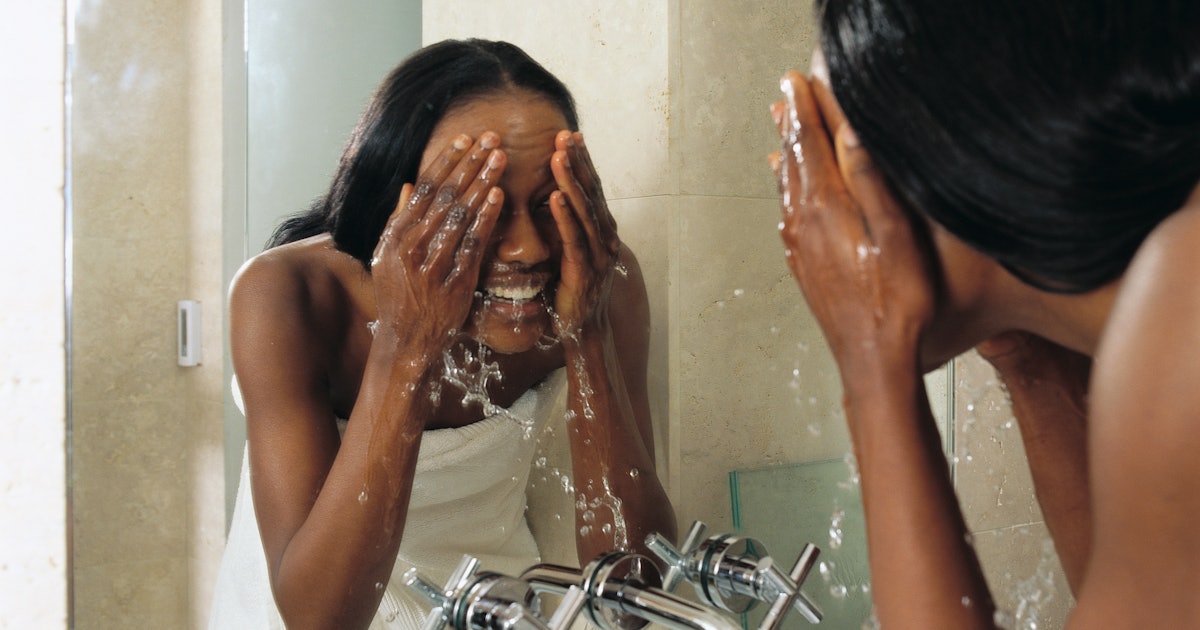
In 2020, when Elizabeth Warren was running in the Democratic Party’s Presidential Primary, a reporter asked her about her remarkably dewy, flawless complexion. She revealed an unorthodox approach to skincare: Pond’s moisturizer and never washing her face.
As someone who has spent an unreasonable amount of money on skincare products, such a simple, low-budget routine fascinated me. But is there actual science behind Warren’s method? Inverse spoke with two board-certified dermatologists about the best way to wash your face.
Should you wash your face?
Tina Alster, a board-certified dermatologist in Washington D.C. tells Inverse that washing one’s face with water is only effective if there is “little to no debris on the skin’s surface.”
For example, if someone only uses a light moisturizer in the evening, they might not need to wash their face in the morning. (If Elizabeth Warren only used Pond’s moisturizer count, it may explain why she’s able to wash with just water.)
However, Alster says, “If makeup, sunscreen, oil, or dirt is [there], a water rinse is insufficient to clean the skin.”
If you use a creamy cleanser, which is very hydrating as well as effective as a makeup remover, you don’t need to use any additional makeup remover unless you can see evidence of your makeup after cleansing, she says. If something like mascara lingers post-cleansing, use a makeup remover to get rid of whatever is left.
Skylar Souyoul, a board-certified dermatologist in Shreveport, Louisiana agrees.
“You really need to wash your face at least one time a day with some type of wash to get all the dirt, oil, and sweat off from the day,” she says. “If someone has very sensitive skin they can use something as simple as a Dove Sensitive Skin Bar.”
A 2020 study published in the Journal of Cosmetic Dermatology examined how well water, cleansing oil, and cleanser washed off non-waterproof sunscreen. The researchers found that only cleanser and cleansing oil effectively removed the sunscreen.
Alster’s and Souyoul’s recommendations are echoed by the American Academy of Dermatology (AAD), which recommends using a gentle, non-abrasive cleanser without alcohol.
Alcohol says Souyoul “strips the skin of natural oils and can lead to dryness. Alcohol can also help other ingredients penetrate the skin deeper, further leading to dryness.”
Some alcohols called fatty alcohols, which are derived from coconut or palm oil are beneficial in skincare because they help draw in and hold moisture, Alster says, but “simple alcohols, like ethanol and isopropyl alcohol, are drying and damaging for most skin types, especially those with dry, sensitive skin, or rosacea.”
In addition to avoiding cleansers with alcohol, the AAD also notes that you should limit the number of times you wash your face to twice a day: once in the morning and once in the evening. However, if you’re sweating after a workout, you should wash your face as soon as possible after finishing the workout because “perspiration, especially when wearing a hat or helmet, irritates the skin.”
What cleaners do dermatologists recommend?
Alster recommends a “cream or lotion cleanser that can gently lift dirt, makeup, and debris from the skin’s surface and can be rinsed away easily.” Examples include cleansers made by companies like Oil of Olay, Cerave, and Dove.
Souyoul agrees that you don’t have to go for pricy brands for a gentle and effective cleanser.
“My favorite drugstore foaming face wash is La Roche-Posay Toleriane Purifying Foaming Cleanser,” she says. “But plain Cerave or Cetaphil face wash also works great.”
The American Academy of Dermatology notes that we should be washing our faces with lukewarm water, avoiding scrubbing, and then pat our faces dry with a soft towel, as rubbing can irritate the skin.
What are the biggest face-washing mistakes?
Both Alster and Souyoul emphatically agree that scrubbing or otherwise over-exfoliating is a too common mistake and can do serious damage to one’s skin.
Souyoul says, “If you have sensitive skin, you likely do not need to exfoliate.” If you don’t have sensitive skin “one or two times a week is more than enough.” She recommends exfoliating in the morning, because “if you are using a retinol at night you do not want to exfoliate right before you use it or it can cause more dryness and irritation.”
Alster says “It is not necessary to be ‘squeaky clean!’ In fact, removing all surface oil leads to skin irritation and sends a signal to the oily glands to produce yet more oil.”
Similarly, she says, toners and scrubs are unnecessary and can be harmful, “either by over-drying the skin or creating abrasions in the skin through which bacteria can enter.”
That can lead to acne and other infections.
While some might swear by washing their face with plain water, it may not be the best plan for someone wearing sunscreen and makeup on a daily basis. If you want to keep your routine minimal and irritation-free, follow Souyoul’s simple advice: “When in doubt just use a gentle face wash with no active ingredients or exfoliant.”